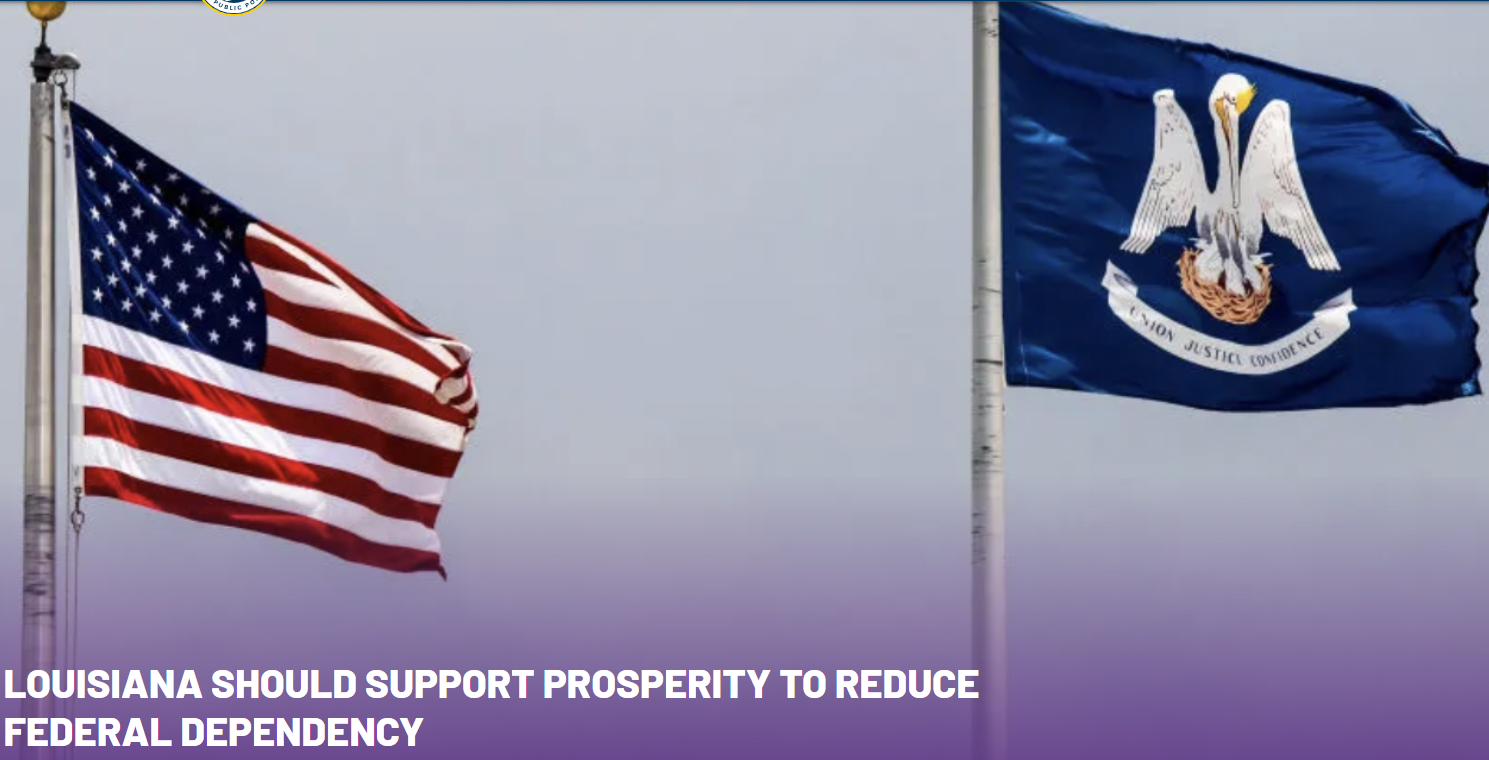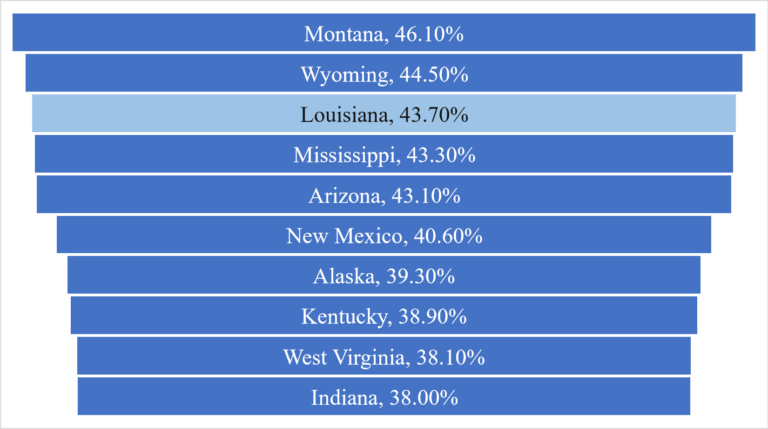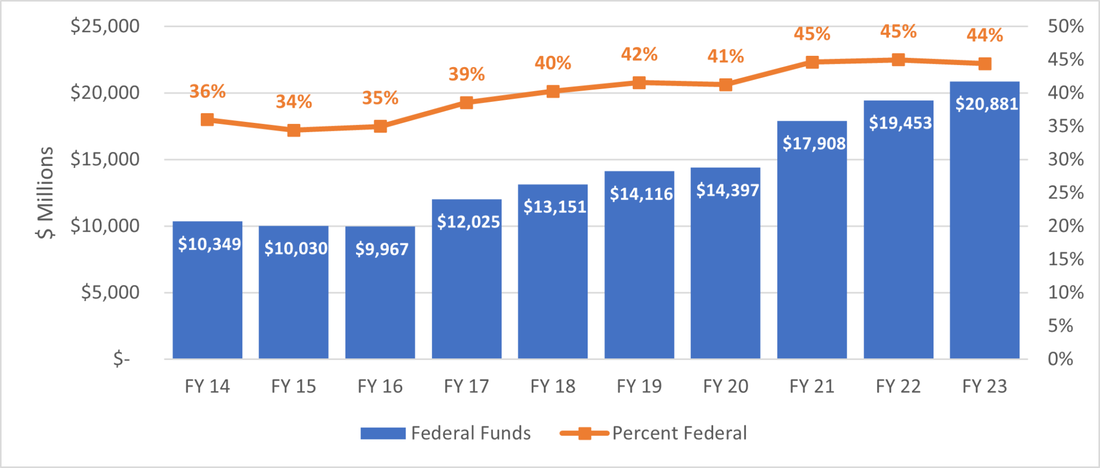|
Louisiana’s state government is the third most dependent state on federal funding. This is according to a report recently released by WalletHub that shows state rankings, with Alaska and Wyoming coming in at first and second. This follows another report release by the Tax Foundation that also ranks Louisiana as the third most dependent on federal funds, with only Montana and Wyoming ahead. This trend doesn’t appear to be getting any better. In 2014, federal funding comprised just 36% of the state’s total budget, whereas today, that percentage rises to 44%. The substantial increase in Louisiana’s use of federal funds from 2016 to 2017 is primarily due to Medicaid expansion. This program expanded the number of individuals eligible to receive Medicaid, and therefore increased the amount of money in the state’s general fund needed to match the additional federal funding. The match rate ranges from 30% to 40% per year based on personal income in the state. Disaster-related recovery has also contributed to the increased use of federal funds. Beginning in 2020 and 2021, Congress sent a large amount of federal funds due mostly to the COVID-19 pandemic response. There were also two major hurricanes, Laura and Ida, and numerous smaller hurricanes that also occurred in those fiscal years, which prompted an additional influx of federal funding from FEMA, HUD, and other agencies. Every program that is either partially or fully funded by the federal government comes with restrictions on its use – the “strings attached.” The substantial increase in Louisiana’s use of federal funds from 2016 to 2017 is primarily due to Medicaid expansion. This program expanded the number of individuals eligible to receive Medicaid, and therefore increased the amount of money in the state’s general fund needed to match the additional federal funding. The match rate ranges from 30% to 40% per year based on personal income in the state. Disaster-related recovery has also contributed to the increased use of federal funds. Beginning in 2020 and 2021, Congress sent a large amount of federal funds due mostly to the COVID-19 pandemic response. There were also two major hurricanes, Laura and Ida, and numerous smaller hurricanes that also occurred in those fiscal years, which prompted an additional influx of federal funding from FEMA, HUD, and other agencies Every program that is either partially or fully funded by the federal government comes with restrictions on its use – the “strings attached.” Most of the federal funding is used for social safety-net programs. Louisiana has the highest poverty rate in the nation, with nearly 20% of the population in poverty and even more on at least one safety-net program. State and local spending on these programs create an annual burden of nearly $3,000 per person.
To reduce the state’s dependence on federal funds for large line-items such as social safety net programs, the state must empower more individuals to realize their own self-sufficiency and ability to flourish. Work must once again become a priority. WalletHub’s report also compared states using their gross domestic product, or GDP, per capita compared to the amount of federal funds flowing into each state. Louisiana is placed in the “high dependency, low GDP” category, with a GDP ranking of 40th in the nation. Louisiana’s economy is not growing as fast as the rest of the country. With the highest poverty rate in the country, lawmakers need to pursue reforms that will make the state more economically competitive and increase opportunity for all Louisianans. Research has shown that more responsible state budgeting and spending, tax relief, and removing barriers for employers to start businesses and workers to work help reduce the number of people in poverty and reduce the dependency on the federal government by individuals and the state. According to WalletHub and the Tax Foundation, Utah is one of the least dependent states on federal funding. This is because the state reformed its social safety-net system decades ago, linking assistance with employment opportunities. This made Utah the state with the fastest economic and job recovery post pandemic. Louisiana should take a page out of Utah’s playbook and achieve the same. It’s time to reduce the state’s and individuals’ dependence on Congress and the national debt, which exceeds $31 trillion and is shared by all states including our own. And it’s time to get Louisiana off the top of another bad list and into a comeback story that we know is achievable. Originally published at Pelican Institute.
0 Comments
Leave a Reply. |
Vance Ginn, Ph.D.
|




 RSS Feed
RSS Feed